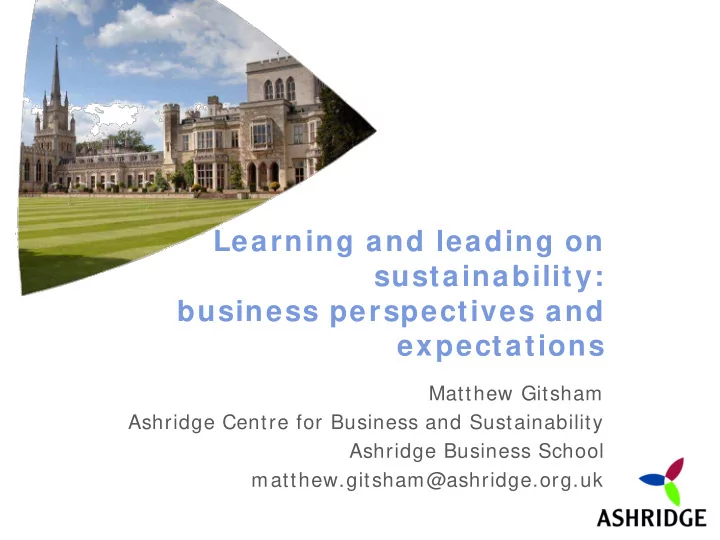

Learning and leading on sustainability: business perspectives and expectations Matthew Gitsham Ashridge Centre for Business and Sustainability Ashridge Business School matthew.gitsham@ashridge.org.uk
2
W hat does the shifting landscape of global trends m ean for leadership and leadership developm ent?
76% of CEOs and senior executives say that it is important people across their organisations have the mindsets and capabilities for this new landscape Fewer than 8% believe these mindsets and capabilities are being developed very effectively by their own organisations or business schools Source: Gitsham et al, Developing the Global Leader of Tomorrow, Ashridge and EABIS for the UN PRME, 2009
How important will the following changes be in order to reach a “tipping point” where sustainability is embedded within the core business strategies of the majority of companies globally? Source: Adapting to a changing context: the role of management education Data collected as part of UN Global Compact-Accenture 2010 CEO Study, Analysis and interpretation by Ashridge and EABIS for the UN PRME ff
“There is something about people in different roles needing to know something about all of this for them to continue to be effective. I think it depends on your function. “I think, within certain areas, you do need to up-skill so they consider sustainability, so for example, our engineers who are designing our products need to think about sustainability because actually when they invented the auto standby that powers down our boxes after several hours, during the day or night, down to standby, that saves more than twice what our entire carbon footprint is in a year and it saves £20 million for our consumers, so they would need to be educated in that. And our facilities people, they now have experts who are specifically trained to think about things like renewables, CHP, how do we make our buildings more sustainable, and they co-own those things. So in certain functions I think you need deep training. “In other functions I think sometimes it's just a signal to say actually this stuff matters. You should take it seriously. We will hold you to it if you don't take it seriously. The leadership development programmes are a good space for having the conversations about why this is important and why we’re doing what we’re doing as a business. It’s not that every single senior manager should be a deep expert in sustainability. The fact is though they need to realise that it's really important to the success of the business and that's the point, that's really important.” Source: Leading Organisations of Tomorrow, Ashridge, forthcoming
CEO reflections on the changing nature of leadership 1. Business leaders needed to adopt a new general outlook and understanding of the intersection between their business interests and those of the wider world 2. To act on this new outlook, they have needed to employ a mixture of: 1. A number of long established and well understood leadership practices 2. A number of ‘new’, less well understood and developed leadership practices Source: Leadership in a changing world, Ashridge and IBLF, forthcoming
I m plications for m anagem ent education… Source: Gitsham et al, Leading Organisations of Tomorrow, To be published by Ashridge in 2011
Sum m ary • If we look at the innovators and early adopters to understand emerging needs of mainstream, then: – They recognise a clear business need, and see that change in management education is one of the core aspects of how they address this need – W hat they think they need is a mixture of specific skills and a broader general shift in perspective and commitment – From their experiences from in-house management education, the how looks like a combination of technocratic skills development and curriculum tweaking, coupled with a more experiential kind of emotional experience to build commitment
Recommend
More recommend